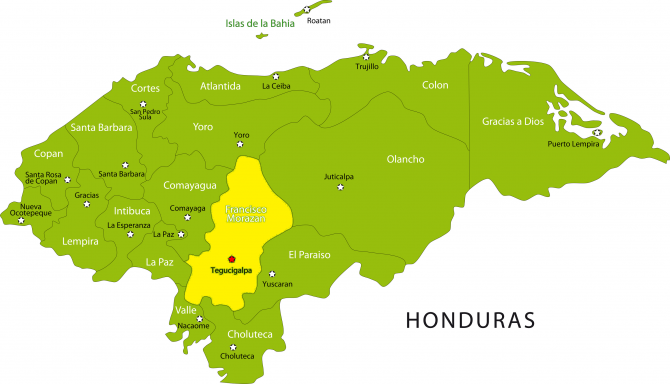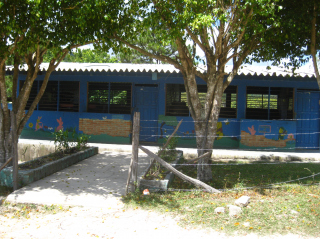El Junco y Joyas, Joyas Del Carballo, Honduras
![]()
![]()
![]()
![]()
![]()
![]()
![]()
 Click on Programs to learn more about their work in this community
Click on Programs to learn more about their work in this community
General Information
| Population* | 200 |
| Number of homes |
45 |
| Avg # of people per home | 4.4 |
| Number and % of children |
(0-5yrs): 17 /11.0% (0-9yrs): 35 /22.7% |
| Electricity | No |
| GPS |
N 14° 20.856’ W 086° 54.329’ |
| Altitude | 1085m |
| Municipality | San Juan de Flores |
| Department | Francisco Morazán |
| Corresponding Health Center | CESAR-Joyas del Carballo |
| Distance from compounds | 1 hour, 15 minutes |
| Road conditions | Good |
* Population does not reflect how many patients will be seen on medical
brigades as many people from surrounding communities come seeking
Medical Brigades medical attention.
Top Three Needs Expressed
El Junco and Global Brigades are proud to say that through holistic programming, the top health and economic needs of the community have been covered. El Junco also has proven strong leadership and capitalized funds in their community bank in order to address any needs that arise in the future.

El Junco & Joyas are in the Cantarranas municipality of the Francisco Morazan department.
El Junco y Joyas’ educational system includes Kinder, Primary, and Middle schools (through 9th grade). There are about 74 students and the school director is Dora Salgado. It is estimated that about 90% of the community knows how to read and write.
El Junco y Joyas has a water system built by the government water institution SANAA in 1985. The main problem with the water system was that there is not enough quantity for the number of people in the community, as it has grown over the years. When Water Brigades first entered the community of El Junco a dire water need was observed. Furthermore, it lacked strong leadership,organization, and motivation due to having lived so many years without a proper water system and no government support. Building two separate systems and giving each community power over its own system and proved a great success. In addition, Water Brigades was able to see the change in community organization and buy-in to their water system throughout the project.
El Junco y Joyas has a health center in the community that provides general medicine and is staffed by local nurse Laura Diaz Arazo. There is a Community Health Committee with 9 members as well as an environmental committee that focuses on forest preservation. Dental care is not available in the community.
The most common illnesses seen by community members are the common cold, acute respiratory infections, diarrhea, and intestinal parasites. According to GB interviews, approximately 62% of the community has latrines that currently function. Prior to GB, 0% had eco-stoves (estufa justa) but now about 24% of the community has these new eco-stoves. About 52% is estimated to have concrete floors and 60% to have pilas (water storage units).
See Tables I and II on page 5 for some available health center statistics from the CESAR-Joyas del Carballo2.
The people of El Junco are very hard working. Each family has its own small plot of land where they grow coffee and/or plantains, which they sell as their main source of income. Many community members work by the day for the standard pay of HNL 100 (around USD 5) as masons or peasants on others' land, but this is far from representing a stable and predictable source of income. On top of this, the agricultural activity tipically requires investments to be made beforehand, that is to say, way earlier than the crops are harvested and sold producing a revenue. It is evident that the necessary purchases of fertilizers and seed become very difficult when savings are not available. The Microfinance Brigades in-country team and brigaders from five different universities have worked in El Junco since 2009. During this time, staff and volunteers have worked with community members to train and establish a Community Rural Bank (Caja Rural), provide educational seminars to adults and children in the community on the importance of savings, promote voluntary savings in the community to reach a level of sustainable capital for the Caja, go on door-to-door community visits to further encourage community members to trust the system of the community bank and open accounts to actively save ,provide community-wide workshops to sensitize community members about the importance of creditworthiness and reliability in repaying loans, and concede loans to all Public Health beneficiaries to finance the completion of the projects and collect over 93% of the overall loaned capital. El Junco will also start to sell coffee through Café Holistico.
El Junco y Joyas does not currently receive medical brigades from any other organization other than Global Brigades. EDA, the Economic Development Agency, and Fundación Vida have currently been working with agricultural workers in the production of plantains as well as assisting with training and provisions for better seeding (semillas mejoradas). Previosuly, there was a group of ophthalmologists who came from Tegucigalpa to do a brigade about 3 years ago. Over 10 years ago, ALA 8620 completed the most recent latrine project.
El Junco y Joyas is located far from any highway that would allow easy access to outside employment or health care. Global Brigades has a strong relationship with this community and is currently investing many programs here, with Medical Brigades, Public Health Brigades, Microfinance Brigades, and Water Brigades having implemented projects in the community since September 2009.
Check back soon for photos!
Source of information: Key informant interview, Centro de Salud statistics
Date of interview: 11 May 2010
